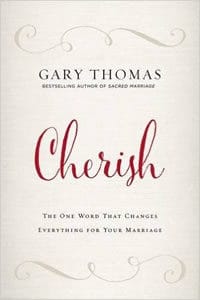Gary Thomas: Most wives don’t want to know that their husbands are just willing to be committed to them, and most husbands don’t want to know that their wives just put up with them. We want to be cherished. A friend of mine was driving with seven other men, and he said, “How many of you feel that your wives love you?” Every man raised his hand. And he said, “How many of you believe that your wives like you?” Every hand went down.
Jim: (laughs)
John Fuller: And that’s Gary Thomas describing what he calls a new mindset for marriages, something that can improve and strengthen your relationship with your spouse. Gary is our guest today on Focus on the Family, and your host is Focus president and author Jim Daly. I’m John Fuller.
Jim Daly: Well, John, I can relate with Gary’s comment. There have been times where Jean, my wonderful wife, has said, “I love you. I don’t really like you right now.”
John: Mm-hmm.
Jim: (laughs) And that’s been a wake-up call, ’cause I’m thinking, “Okay, what have I done?” And you start doing the inventory. Uh, what Gary’s talking about is such a powerful word, cherish, which means to hold dear, to feel or show affection or to care for someone or to nurture them. And in today’s culture, I think we’ve lost the meaning of that and certainly don’t practice it enough in our marriages. Ironically, millions of us who got married said those very words in our vows. We said, “We promise to love and to cherish until death do us part.” And here at Focus on the Family, we want to help you bring this word, cherish, back into your marriage and show you how you can love your spouse more deeply. Uh, it’s something we got to work on every day. Gary’s got a great message for us today, and I’m really looking forward to it.
John: And Gary Thomas has been here a number of times. He’s one of our most popular guests. He’s a prolific author and speaker, and we’re so glad that he moved to Colorado and became our neighbor. Today, we’re gonna hear about a book Gary wrote called Cherish: The One Word That Changes Everything For Your Marriage. It’s a wonderful resource for every couple, and we’d recommend it to you. Find out more at focusonthefamily.com/broadcast or call 800, the letter A, and the word FAMILY. And now, Jim, here’s how you began the conversation with Gary Thomas on today’s episode of Focus on the Family.
Jim: Hey, let me ask you. You, you heard my little intro on Cherish.
Gary: Mm-hmm.
Jim: And it did strike me, we say that word when we do our marriage vows, but I don’t know that even Jean and I, if we’ve ever talked about it since that day. (laughs) I mean, what’s your definition of cherish?
Gary: I believe cherish is taking our marriages to the next level. You mentioned how all of us, just about all of us pledge to love and to cherish til death do us part. We always speak about love. When we think about love, we think about commitment and sacrifice and hanging in there. Cherish raises the bar a little bit higher. And it’s interesting, ’cause when I was working on this book, I would ask women, “How do you feel cherished? What makes you feel cherished?” And it’s like, turn over the hourglass, (laughs) get a cup of coffee, ’cause you’re gonna be there for a while. And I would say to guys, “What makes you feel cherished?” And there’d be, “Uh, am I supposed to be?” Almost, like, awkward.
Jim: (laughs) Yeah. Right.
Gary: And-
Jim: It doesn’t sound like a masculine word to cher- be cherished.
Gary: But here’s what I found. I, I, I put it in the language of a car. Lot of guys are into their cars.
Jim: There you go.
Gary: What does it mean to cherish your car? Well, if you cherish your car, you protect your car. You’re not driving down potholes. You’re, you’re indulging your car. You’re giving it the best wax job and the wash job. You think about that car, and when you do, it gives you pleasure. You want to showcase your car. You want others to see. “Hey, come on outside and, and see my baby.” And it’s kind of funny. I don’t mean to insult wives, but I’d say, “Can you treat your wife the same way you treat the favorite car you’ve ever had, you know, before you had to get the SUV or the minivan?” But, but that-
Jim: (laughs)
Gary: … that has that direct application. And, and I think it’s so sad that we often think of cherishing things more than cherishing people. But the good thing, I think the good news is that cherishing is a skill that can be learned.
Jim: Yeah.
Gary: It can be practiced. We can choose to cherish. You know, infatuation comes and goes, but cherishing is something that we can build.
Jim: Now, you see that cherishing happening even back to the garden.
Gary: Yes.
Jim: Adam and Eve.
Gary: Yeah.
Jim: Uh, refresh my memory. Where did you catch that moment where there was cherishing occurring?
Gary: That, I believe, is the goal of a cherishing marriage. You might ask, “Why were Adam and Eve in paradise? Why were they so happy early on in their marriage?” You could say, “Well, there wasn’t any sin,” and, and that’s true. I don’t think it’s just because they were naked and unashamed. Some younger men might think that, (laughs) but I don’t think that was it. Here’s what I think was a huge spiritual issue going on. When Adam first saw Eve, there was literally no one to compare her to.
Jim: She was it.
Gary: There was no Juanita.
Jim: (laughs)
Gary: There was no Shanice. There wa- there was no Janet. There was just Eve. She defined what a woman was for Adam, and Adam defined what a man was for Eve. H- he couldn’t say, “Well, she, Juanita has a better sense of humor, or Shanice has, is slender or curvier or has, you know, more intelligence or is more gracious.” She just defined woman for him. And I often tell guys… ‘Cause this is a time when guys often cherish their wives. It used to be when the bridal march started, everybody would turn around and watch the bride come in, but I’ve noticed that’s changed, and I think the internet memes have sort of changed that. A number of people look up front at the groom’s face.
Jim: Right.
Gary: Is he crying? What’s his expression? They, they want to see that. And I’ve stood by a number of those men as a pastor when they’re watching that bride come down the aisle, and at that moment, she’s the only one she see- he sees. There are hundreds of other women in the room, hundr- others women, the… She, he is just so fixated on her. He’s focused. She’s the only woman in the world to him. And I said, “Cherishing is about making that a daily reality, not a once-in-your-lifetime experience, but a daily reality.” Marriage will take off when a woman hears Song of Songs 6:9 from her husband. Like-
Jim: And what is it?
Gary: “My dove, my perfect one, is the only one.”
Jim: Ah.
Gary: Just think about it. “I, my dove, my perfect one, is the only one. I don’t want you to be anyone else. I’m never comparing you to anyone else. I love you for who you are. You are my woman. You define woman to me.” And the wife’s saying the same thing to my husband. “You are my man. You define what it is to be a man to me.” That’s when you really feel cherished. That’s when you really feel accepted. And I think that’s what Song of Songs is getting at, that cherishing attitude. First Corinthians 13 celebrates love. Song of Songs celebrates cherishing.
Jim: Now, some couples, or let’s just say some wives are going, “Ugh. I don’t have that. I want that.” Maybe some husbands, too, are saying, “I wish we had that kind of relationship.” How does a couple reset and recalibrate because we’ve not recognized that, uh, important ingredient of cherishing one another? How do we change it today? We’ve been perfunctory. We love each other. We said those words-
Gary: Yeah.
Jim: … and we remember that commitment, but we don’t cherish each other.
Gary: Mm-hmm. There has to be a new mindset, and then there are a number of practices we can put into place. So let me start with the mindset, and then we can go to some very practical, specific things that you can do. The mindset, I think, is best captured by a statement about the ballet. A Russian-born choreographer, George Balanchine, once said, “The ballet is woman.” By that he meant that the best, at least in pas de deux, the couples dancing, the best male dancers recognize people come to the ballet to see the woman, her agility, her grace, her strength, her beauty. And so his job is to help her be more than she could be on her own. Because he can lift her, turn her, support her, catch her, she can do things that you just can’t do on your own. And George Balanchine also said, “My job is to make the beautiful yet more beautiful.” And I think if men would adopt that attitude, “How do I showcase my wife? How do I hold her up? How do I support her so that people see the beautiful woman that I know is there?” And then you help her through that performance. And then I love it at the end if a, if a male dancer has done his job. He’s helped her, he’s supported her, she’s wowed the crowd. He finally throws her. She lands in the spotlight. It’s so powerful. The audience stands up, and a thunderous standing ovation. And the male dancer steps back in the shadows. He’s breathing hard, but he’s done his job. The female dancer is celebrated. She’s adored. That’s it, what he was there to do. Now, the challenge is, when marriage takes off, the man has that attitude and the wife has that attitude. You can’t demand that. You have to accept that. And so that’s the mindset, though. How do I showcase my spouse? That’s the foundational part, thinking of marriage as ballet. How do I support them so that others can see their beauty? And so the idea is, how do I take somebody who’s probably been beat up in life and ignored and rejected, how do I indulge them with my love and celebrate them so they become really the powerful person God created them to be?
Jim: Yeah.
Gary: Celebrated and even, uh, recognized by others.
Jim: You know, in, in many ways, uh, Gary, that can sound exhausting. The demand is so high to be able to do that. God, of course, can do that, but I’m not God.
Gary: Right.
Jim: I’m just somebody’s husband and a friend to many. How does that person, uh, you know, see that requirement to cherish in that way and actually begin to meet that expectation?
Gary: My marriage changed when God gave me a heart that took pleasure in my wife’s pleasure. I think that’s the difference.
Jim: Was there a moment that occurred? H- how h-
Gary: No. No. I, I think it was going through these scriptures. I think it’s just praying about my marriage, asking God to come into my marriage. But when I got my highest fulfillment in loving her well and just sensing that, I… You know, when we talked earlier in a broadcast about lifelong love, seeing our marriage as worship, that, recognizing that that’s one of the best ways that I could love my Heavenly Father, was treating him as my father-in-law and loving on his daughter. And, and I think it was sort of a corollary from that when it came down from that and just being able to realize that that’s when I find the most meaning in my marriage. And so it’s not, it’s not a burden. It’s not oppressive. It’s kind of fun. It, it’s a delight. It’s just a change of, of mindset. And here’s the thing. The lust to be appreciated, to be noticed, to be served, to be pleasured, is like any other lust. It can’t be satisfied. It has to be crucified. If you’re still operating with that mindset in marriage, you can’t have a spouse that can focus on you that much to satisfy the lust, because you just, you’re never noticed enough. You’re never appreciated enough. But when you have the attitude of Romans 12:10, “Outdo one another in showing honor.” And so, okay, if I want to be a faithful believer today, I’ve got to outdo my spouse in showing her honor. Then if your spouse isn’t honoring you f- okay, this is an easier day. (laughs) You’re running downhill that day, not uphill. If your spouse is really spoiling you and loving on you, you think, “Man, it’s gonna be hard to obey scripture today.”
Jim: (laughs) Rise to the challenge.
Gary: “I’ve got to really up my game.” And it’s, it’s that sense of fulfillment that comes. And, and there’s just a joy that comes, I think, from aligning your heart with God’s.
Jim: We’ve talked a lot about the relationship and how a man needs to honor h- and cherish his wife. How, what does that look like in the other direction, a wife cherishing her husband? Uh, what are some of those examples?
Gary: Well, when the wife looks at her husband like Adam, the way I describe it is that w- the day she gets married, she has a commitment to contentment. No guy has it all. You have to realize that your guy has certain strengths and he doesn’t have other strengths.
Jim: (laughs) So start with a deficit. That’s how we begin this.
Gary: Right. And you decide that he defines what a successful husband is for me. I’m not gonna compare him to Joe. I’m not gonna compare him to Frank. I’m not gonna compare him to Antoine. And women, I don’t think they really realize they’re doing it. I was working with a young couple, and he was a champion swimmer in high school, so he got attention from an Ivy League school that had him come to their school because he was willing to, to swim for them. And he had a girlfriend who now has become his wife, and she was just seeing somebody else that it was a, an actor or a football player or something that was just stacked, and she just remarked about it. And he thought, “Man, I’ve got to look like that,” and so he starts lifting different kinds of weights and whatnot, but that actually made him less effective as a swimmer. Because if you’re a really good swimmer, you’re not gonna be necessarily a really good linebacker, or vice versa.
Jim: (laughs) It’s true.
Gary: I mean, a linebacker’s just gonna sink. And so it’s a wife blessing her husband with the realization that he can’t be everything, and so when she gets married, she’s making a commitment. If you’re not a handyman, I’m not faulting you for not being a handyman. (laughs)
Jim: Phew.
Gary: If, if you’re not, you know-
Jim: That makes me feel better.
Gary: If you’re not the kind of guy that enjoys two-hour soulful conversations, I’m not gonna feel jealous that my girl friend’s husband, first thing he does, comes home and says, “How about your day? How are you feeling? Where are things going?” That you made a choice, and you’re trying to build on the strengths of that choice.
Jim: You know, Gary, you talked about the, the ballerina. I think that’s a beautiful illustration of a man’s role, a woman’s role, a husband and a wife. And, uh, when a woman feels that cherished, that you’re framing her in all the best light all the time, um, you know her heart’s gonna leap for joy. She’s gonna feel good about who she is. You also use an analogy of second violin. I g-
Gary: Yeah.
Jim: A second fiddle might (laughs) be more commonly said.
Gary: Right.
Jim: You know, I don’t play second fiddle to nobody.
Gary: Yeah.
Jim: You know? (laughs) But how does the second fiddle position work?
Gary: Yeah.
Jim: And what I appreciated about it is that limelight search.
Gary: Right.
Jim: Who’s gonna be the one in the limelight?
Gary: It came from a famous conductor who said, “I can get any number of first violins.” He goes, “The most difficult person to find is a second violin.”
Jim: Not because of their playing ability, but because of their attitude.
Gary: Willing to play that role, to put as much effort and excellence and meticulousness into playing second violin as you do for the first violin. But he says, “Without the second violin, the orchestra isn’t gonna sound well.” I mean, you’ve got instruments that they do their part. If everybody’s trying to play first violin, it’s gonna be a disaster. And that’s what happens in marriage, is that we always want to be first violin. And, and people are listening today and saying, “Boy, I wish my husband was like that with me as the ballerina.” And that’s the mindset that we’re talking about that… Do we believe Jesus or not? He said, “It’s better to give than to receive.”
Jim: Right.
Gary: And it’s hard for us to trust that. I’m just saying, when I test that out and trust Jesus, I find that those words are true.
Jim: Yeah. Th- that’s powerful. But there’s something in our humanness, in our flesh, that keeps us from moving in that direction. It’s, it’s odd.
Gary: It is.
Jim: Especially for us as believers. And that’s true in our marriages too, Gary. Um, talk a bit about how you undo those patterns that you’ve been maybe into for 10 years or 20 years, or in Jean and my case, it’d be 30 years we’ve been married.
Gary: Yeah.
Jim: And I see those things. Sometimes temperament can come into this. I could see, as I read the book and looked at the material, um, temperament… You know, one of the things for me, when I’m under pressure, my personality type, as I’ve tested it, I can be a verbal attacker. I mean, I will respond with verbal jabs.
Gary: Right.
Jim: And I could see how that doesn’t play well in cherishing, so I’ve got to learn how to back that off and think before I speak, right, rather than saying, “Man, have you looked at the house today?”
Gary: (laughs)
Jim: Uh, that would be like a verbal jab.
Gary: Right.
Jim: Or, “What’s happened today?”
Gary: Well, see, that’s why I like to present cherish as a new model of marriage. Uh, most wives don’t want to know that their husbands are just willing to be committed to them, and most husbands don’t want to know that their wives just put up with them. We want to be cherished. A friend of mine was driving with seven other men, and he said, “How many of you feel that your wives love you?” Every man raised his hand. And he said, “How many of you believe that your wives like you?” Every hand went down.
Jim: (laughs)
Gary: Those husbands felt loved. They didn’t feel cherished. So what you’re talking about is exactly where we need to go, Jim, because I, I do think that needs to be the new model. I don’t want my wife just to know that I love her. I want her to feel cherished. And a lot of it comes with this mental determination that I, I’m gonna display cherishing. Let me give a couple examples where I’ve seen it in action and it’s worked really well. I got into an elevator one time. Another married couple got in, middle-aged. And I’m in the back of the elevator, and he’s standing in front of the buttons, just kind of staring at them. (laughs)
Jim: (laughs)
Gary: So his wife says, “Floor nine.” And you’d think she’d just given him a physics test.
Jim: (laughs)
Gary: I mean, he’s, he’s, he, (laughs) he c- I, I wanted to say, “It’s between eight and 10,” but that would have been mean.
Jim: (laughs)
Gary: So I just, I j- and, and she just smiled. He finally found it, and she just cuddled up to him and said, “Your mind is really full about that business meeting, isn’t it?” He goes, “Yeah.” She goes, “Don’t worry. It’s gonna come out.”
Jim: Wow.
Gary: And, you know, she could have shamed him. She could have been sarcastic. But what she did is she recognized he’s doing something really important, and so that’s distracting him from something that really doesn’t matter, and so she chose to look at the best, not to use it as a moment to ridicule him or belittle.
Jim: Hm.
Gary: And I think that man walked out of the elevator feeling cherished and supported and, um, encouraged. Here’s how a, another wife did it. It was great. And it was a younger couple. They got married very young and got pregnant almost right away. And they’re walking through a mall. She is eight months pregnant at this time, and she’s just kind of sauntering through the mall, trying to, to get going. And this beautiful, lithe, blonde woman walks by, very athletic, and her husband, Brian, says, “Man. I forgot how pretty you are when you’re not pregnant.” (laughs)
Jim: Ooh.
Gary: He really said that.
Jim: (laughs) Yikes.
Gary: And she just broke out crying, and he honestly didn’t know why she was crying. He thought he was complimenting her. (laughs) And here’s what was so amazing when I was talking to her. And this is why they are now happily married 28 years later. She goes, “I realized I had to give him the benefit of the doubt. He would never intentionally hurt me. And we laugh about it today.”
Jim: Yeah.
Gary: Because he honestly was mystified. “Why are you crying? I don’t know.”
Jim: (laughs)
Gary: And she goes, “You know what? It can be really hard for a new bride to do that with her husband. She doesn’t understand the way a man thinks. She doesn’t understand the way a, a man feels.” And she says, “At least give your spouse the benefit of the doubt.”
Jim: That’s a gracious woman, let me tell you.
Gary: (laughs) Definitely.
John: Gary Thomas is our guest today on the Focus on the Family with Jim Daly. I’m John Fuller, and if you’d like to learn more about Gary’s terrific book, Cherish, give us a call. Our number is 800, the letter A, and the word FAMILY. 800-232-6459. Or stop by focusonthefamily.com/broadcast. Now as we return to the conversation, I had a chance to ask Gary this question. Gary, why is it so hard for us to give that grace? I mean, it seems like a lot of younger couples, they live there, and then time kind of happens and kids happen-
Gary: Yeah.
John: … and we get a little more comparing.
Gary: Yeah. Yeah. You know, I think part of it is just our sinful nature, because the reality is, a cherishing marriage is so rich. It’s worth working for. I think one of the biggest lies is that infatuation is the pinnacle of marriage. And the reason I wrote Cherish is that infatuation neurologically lasts about 12 to 18 months. Unless you have a damaged brain, (laughs) it can’t go longer than that. Cherishing is better. I’ve been infatuated, and I’m in a marriage where we’re growing and cherishing. I’m saying cherishing is better. I don’t envy those infatuated couples because I know the infatuation’s gonna end, and they’re gonna have to do the hard work of realizing who they’re married to, go through the grace and forgiveness and get through the bitterness. And the other thing, John, that’s just so silly is contempt makes no sense. Th- I was with a couple one time at a dinner, and he’s a very quiet man, and he wasn’t participating at all. I was just trying to be nice and bring him into the conversation. And so knowing what I did, I said, “Don’t chefs usually think such and such?” And she immediately cut in. “He’s not a chef. He’s a cook. A chef prepares things. He just heats them up. There’s a difference.”
Jim: (laughs)
Gary: And it was clear that she was afraid I was gonna give her husband a little more respect than he deserved, and she was horrified. “Why would anybody respect my husband?” And I knew his situation. He worked at a rest home. He had charge of a kitchen where they fed 200 residents every day. And, and I know that the budget is always tight, and then say, “Okay, here’s the budget, and we’re cutting it by 10%.” And you’ve got to offer three different entrees. And so sadly, a lot of meals probably are just heated up and whatnot. And I thought, “Here’s a man with really a, trying to make a noble effort.” He can make a difference in those people’s lives. He can maybe… Why won’t she pray for, um, even a miracle of provision like Jesus feeding the 5,000? She could say, “Lord, with a, a decreased budget, can my husband create tasty, nourishing meals for people in a difficult time in their life?” But she was just so afraid that she was not gonna let anybody call him a chef and a cook. And then I just thought, “I, I’m sorry, but how stupid.” Because they’re gonna go home, a- and they’re gonna have a tender evening. “Honey, thank you. H- we had such a wonderful evening. Can I rub your feet? Can I give you a back rub before we go to bed?” He’s gonna feel distant and he’s gonna be quiet, so she’s gonna say, “See how boring a guy I married.” And I just thought, “It, it serves no purpose to express disdain or disrespect or contempt for your…” It’s never in the history of the world produced a more intimate, more fulfilling, and happier marriage. So have contempt for contempt. Aim for cherishing. And cherish is a strategy we can use to bring our spouse to their glory.
Jim: Gary, we are coming in for a landing here on day one. Um, I want to speak specifically to that couple, and I don’t know if it’s the husband or the wife. And again, they’ve been married maybe 20, 30 years, and this is the rut that they have been following now. They haven’t done the cherishing. Uh, again, they love each other. They don’t always like each other. And it’s the way they communicate with each other, et cetera. Um, how would you give them hope? As we sign off today, what do you say to them about changing it tonight, rather than going after each other verbally? What can they do differently?
Gary: Here’s where I think cherishing can point to an entirely different marriage, and why this mindset thing matters. I was in Winnipeg in February. I wouldn’t recommend that to anyone.
Jim: Yeah. (laughs)
Gary: Y- you don’t know cold until you’ve been-
Jim: I think July is-
Gary: … to Winnipeg in, in February. I met a delightful man named Terry who had had two different marriages. Both wives died of a terrible disease. And he had heard me talk on marriage, and he just said, “Gary, what you say is so true, but I want to share my story with you.” He had been married to his first wife for I think 17 years, and she’d been fighting cancer for five years, and the last seven months, around the clock care. Just had to do everything. And when your wife gets that sick, that’s all you can do. She died, and he was single for four years and then married his second wife, who would later die of cancer. But he said his second marriage was so much richer and happier than his first marriage, not because his second wife was more excellent than his first wife. He said, “I knew them both well,” ’cause he’d been married to both of them for almost two decades. He goes, “My attitude was completely different.”
Jim: So it was ab- more about him than them.
Gary: Yeah. “I treated them like you’re talking about. I treated my wife like royalty. I treated my second wife like royalty. I, I called her princess. I treated her like one. I served her.” He goes, “I got used to doing that with my first wife when she went through cancer and I had to do everything, and I had to do everything as a single man, so I just kept doing that for my second wife, and she was so grateful and she was so happy, and she thought she had, you know, already got a taste of heaven. I didn’t know that husbands acted like this,” but he didn’t realize, “I didn’t act like that my first marriage.” But what really hit me and what I really stress is that he was adamant, “It’s not that my second wife was more excellent than my first. That’s not why we had a happier marriage. It’s that my attitude was so different. I cherished my second wife and had a much happier marriage.” And so I’m saying, regardless of what your spouse does, if you cherish your spouse, I believe you’re gonna have a happier marriage.
Jim: That’s a really good word from our guest today, Gary Thomas. And I so appreciate his passion to help couples take their relationship to another level. Uh, because we’ve got to keep growing. We can’t afford to settle and take one another for granted, and I’m guilty of it. I have done that, and I want to work harder to do better. God wants you to use your marriage, and he uses how you love each other as a witness to the world. So make a commitment today to cherish your spouse. Now, whenever we address topics like this, we know there are husbands and wives who are hurting because your relationship is in a tough place, and maybe you’re wondering if your marriage is even gonna survive. Uh, man, I want to encourage you to contact us here at Focus on the Family, because we have so many resources to help and restore your broken relationships, like our team of Christian counselors. Also, our Hope Restored program where we offer intensive counseling over several days to couples who feel like they’re not going to make it. But with God’s help, we can heal their marriages, and it’s happening.
John: Yeah. And Jim, we do survey work, and 80% of those couples two years later are together and feeling good about their relationship. We’re a phone call away. Our number is 800, the letter A, and the word FAMILY. 800-232-6459. Or find all the details at focusonthefamily.com/broadcast.
Jim: And if you and your spouse are in a good place, let me invite you to partner with Focus to share that blessing with so many more couples. This month, we’re trying to recruit a monthly sustainer team of friends like you who are committed to strengthening marriages and helping us rescue hurting couples, husbands and wives who need to know how to get their relationship back on track. When you make a monthly pledge to Focus on the Family, you are doing marriage ministry through Focus, offering godly hope and encouragement to families who really need it. And when you make a pledge of any amount, or even a one-time gift, we’ll send you a copy of Gary’s book, Cherish, as our way of saying thanks for being in the ministry with us.
John: And once again, our number is 800, the letter A, and the word FAMILY, or you can donate at focusonthefamily.com/broadcast. And coming up next time, Gary Thomas returns with more on this topic, including advice on how to become more cherishable to your spouse. On behalf of Jim Daly and the entire team, thanks for joining us today for Focus on the Family. I’m John Fuller, inviting you back as we once again help you and your family thrive in Christ.





















